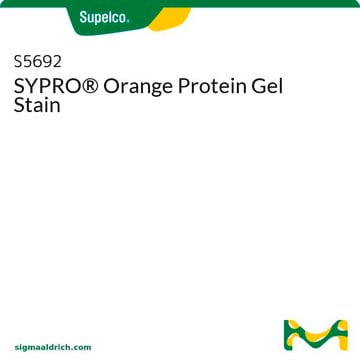Recommended Products
General description
Application
- protein fragments post in vitro pepsin digestion
- ovarian tumor fluid proteome prior to profiling
- the transcription factor (TFIID) complex from Saccharomyces cerevisiae
Reconstitution
Analysis Note
related product
Signal Word
Warning
Hazard Statements
Precautionary Statements
Hazard Classifications
Eye Irrit. 2 - Met. Corr. 1 - Skin Irrit. 2
Storage Class Code
8B - Non-combustible corrosive hazardous materials
WGK
WGK 2
Flash Point(F)
Not applicable
Flash Point(C)
Not applicable
Certificates of Analysis (COA)
Search for Certificates of Analysis (COA) by entering the products Lot/Batch Number. Lot and Batch Numbers can be found on a product’s label following the words ‘Lot’ or ‘Batch’.
Already Own This Product?
Find documentation for the products that you have recently purchased in the Document Library.
Customers Also Viewed
Protocols
Brilliant Blue G-Colloidal Concentrate stains proteins in IEF, PAGE, and SDS-PAGE gels after electrophoresis, enhancing sensitivity with protein fixation.
Brilliant Blue G-Colloidal Concentrate stains proteins in IEF, PAGE, and SDS-PAGE gels after electrophoresis, enhancing sensitivity with protein fixation.
Brilliant Blue G-Colloidal Concentrate stains proteins in IEF, PAGE, and SDS-PAGE gels after electrophoresis, enhancing sensitivity with protein fixation.
Brilliant Blue G-Colloidal Concentrate stains proteins in IEF, PAGE, and SDS-PAGE gels after electrophoresis, enhancing sensitivity with protein fixation.
Our team of scientists has experience in all areas of research including Life Science, Material Science, Chemical Synthesis, Chromatography, Analytical and many others.
Contact Technical Service









